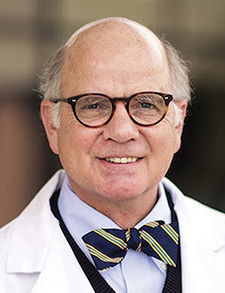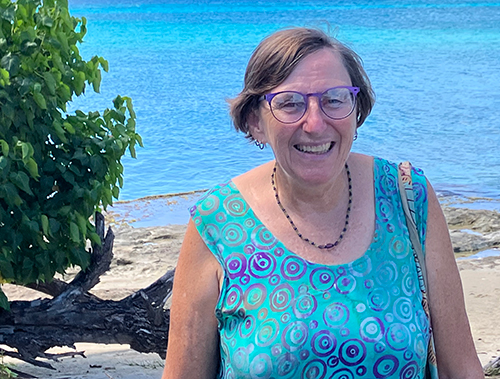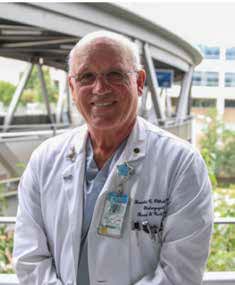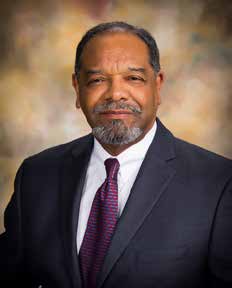 Despite what the American Medical Association has called an epidemic of physician burnout, some otolaryngologists aren’t emotionally or intellectually ready to retire at age 65, or even when it’s time for them to stop performing surgery. It can be incredibly difficult to make a decision about your future, regardless of whether that future is imminent or not.
Despite what the American Medical Association has called an epidemic of physician burnout, some otolaryngologists aren’t emotionally or intellectually ready to retire at age 65, or even when it’s time for them to stop performing surgery. It can be incredibly difficult to make a decision about your future, regardless of whether that future is imminent or not.
ENTtoday spoke to several otolaryngologists who have pivoted away from surgery and are still working in their 70s, many of whom are planning their next gig. Even if you aren’t nearing retirement, it’s never too early to start thinking about what your own future might look like. For many of these otolaryngologists, retirement didn’t always mean leaving medicine, and it ended up being very different from what they had imagined.
ADMINISTRATOR
Myles Pensak, MD, professor, consultant
At age 71, Myles Pensak, MD, hasn’t performed surgery since a spinal cord injury in 2016 impacted his ability to operate. But that didn’t stop him from working. “I had a fairly large administrative portfolio,” he said, “which was not impacted by my inability to operate.”
At the time of his injury, Dr. Pensak was serving as a department chair at the University of Cincinnati College of Medicine, in Ohio, as CEO of the physician practice plan at the university, as senior associate dean for clinical work, and as senior vice president for clinical work at the university’s health system.
Define yourself by the things you value and the things you add to other people’s lives. Don’t define yourself by your work title. — Myles Pensak, MD
Ironically, Dr. Pensak’s injury occurred while he was performing surgery to remove an acoustic neuroma. During the operation, he lost sensation and function in his right hand. “As my partner finished the case, a neurosurgeon walked into our little room outside of the O.R. and I was hyper spastic,” he said. “The next thing I knew I was having a spinal MRI, which showed that my spinal cord had become tethered and my spinal canal had narrowed down to 5 millimeters, at which point they said, ‘You need to do something now.’”
Just as quickly as that, Dr. Pensak was being opened from C-2 to C-5 for spinal surgery. “The only major advantage of having the surgery done, aside from my long-term health,” he joked, “is that it turned my absolutely horrible slice in golf into a magnificent fade because I don’t have full motion in my neck. Had I known, who knows, I might have had the surgery 30 years ago.”
Currently, Dr. Pensak is a professor emeritus of otolaryngology–head and neck surgery and neurological surgery at the University of Cincinnati College of Medicine, where he continues to teach and mentor residents. He’s also the executive vice president of the Triological Society, an appointment that will continue until 2025. Additionally, Dr. Pensak continued to see patients in clinic two and a half days per week until December 2023, when he decided to step away from all clinical work and heed his wife’s suggestion that they spend more time traveling together, which they both enjoy.
“She said to me, ‘Hey, we’re in our 70s, and we’ve got a finite amount of time to really go and do what we would like to do. And really, you can’t go if you have to be back in the office every Tuesday morning, and we can’t leave Cincinnati until Fridays because you’re seeing patients late in the day on Thursdays,’” he said.
Among their future adventures will be a six-to-eight-week trip to France, where Dr. Pensak, a Francophile, hopes to apply the French lessons he has been taking virtually and fully immerse himself in the language and culture to help him better read, write, and speak French. When he’s stateside, he hopes to find a pianist at the University of Cincinnati College’s Conservatory of Music to teach him how to play boogie-woogie, a type of music he has yet to learn in his 60 years of playing piano.
“I have too many friends for whom being the doctor or being the surgeon is how they view themselves,” he explained. “And I think that isn’t a long-term healthy strategy.”
His advice to colleagues contemplating retirement is pragmatic. “Define yourself by the things you value and the things you add to other people’s lives. Don’t define yourself by your work title.”
SURGICAL UTILIZATION REVIEW
Harold C. Pillsbury, III, MD: utilization reviewer, golfer
After more than 40 years of seeing patients in otolaryngology at the University of North Carolina School of Medicine and UNC Health in Chapel Hill, Harold C. Pillsbury, III, MD, has shifted gears in his career, embracing a new chapter of helping others.
Retiring from his jobs as surgeon, professor, otolaryngology division chief, and department chair, Dr. Pillsbury continues to use his expertise by doing utilization review for a third-party review company, Turning Point.
A couple of years ago, Dr. Pillsbury made a conscious decision to step back from operating, recognizing the potential complications associated with age. “I was 73 before I stopped doing surgery, and at that point, I felt that if I had a significant complication, people could legitimately question whether I was too old to be operating on patents, so I didn’t want to keep doing surgery,” he said. He also wanted to create space for younger, skilled surgeons to step into crucial roles.
In his new role, Dr. Pillsbury contributes to the decision-making process regarding proposed surgeries, providing insight into the necessity and advisability of procedures. As part of Turning Point, Dr. Pillsbury and his colleagues assess requests and ensure that there are comprehensive risk–benefit discussions done with patients. Most of the reviewers are nurses who give the proposed procedure either a thumbs up or thumbs down. If it’s the latter, Dr. Pillsbury looks it over.
Recently, Dr. Pillsbury had a case involving a cochlear implant for a patient who had been deaf for many years. The nurse reviewer initially turned down the procedure, stating the patient hadn’t tried a hearing aid for 30 days or more. After reviewing the case, Dr. Pillsbury noted that the hearing aids would be useless for the patient, and that the physician should proceed with implanting the device.
“I really like [doing reviews] and knowing that the patients are getting great care,” he said. “All patients deserve a robust discussion about the risks and benefits of surgical procedures.”
Although the financial compensation is minimal—about $40 per review—the satisfaction of knowing he plays a role in ensuring quality care keeps Dr. Pillsbury engaged in his new endeavor.
VETERANS AFFAIRS, POLITICS
Gregory A. Antoine, MD: chief of staff, dean
Otolaryngologist and plastic surgeon Gregory A. Antoine, MD, has been a trailblazer several times in his medical career and hopes to continue making a difference in a vastly different arena now that he’s no longer practicing medicine.
“I was the first African–American plastic surgeon to lead an academic plastic surgery division at a non-Historically Black Medical School in the United States,” he says of the 12 years that he spent as chief of plastic and reconstructive surgery at the Boston University School of Medicine.
He practiced actively until 2013 when he was 63 years old and performed his last surgery a couple of years later. Dr. Antoine then had the opportunity to pivot and become chief of staff at the Fayetteville, N.C.-based VA Medical Center, overseeing the care of more than 75,000 veterans.
A veteran of both the U.S. Navy and Army, Dr. Antoine is committed to helping veterans. He retired from the Army as a colonel and did his otolaryngology training at Walter Reed Army Medical Center in Bethesda, Md., before going on to complete a plastic surgery residency at Georgetown. His commitment to veteran healthcare was also evident in his efforts to address the opioid crisis during his time at the VA. “In my first three years, I reduced the opioid prescribing rate by 65%, the second highest in the nation,” he said.
In 2019, Dr. Antoine took on a new challenge as the chief medical officer and senior associate dean of clinical affairs at the Morehouse School of Medicine in Atlanta. And in 2021, frustrated with the state of political affairs in the United States, he made a bold move and ran for the United States Senate in North Carolina as a Democrat. (He lost). At the time of this writing, he was considering a run for President in 2024.
Although Dr. Antoine acknowledged that he might not win the Presidency, his primary goal is to spark dialogue around the country’s priorities and future direction. He has invested time in reading, understanding economics, and contemplating his next steps. “I don’t expect to win,” he said. “What I do expect, though, is to have some dialogue around what the nation’s priorities are and where this country is going.”
TELEMEDICINE/ALLERGY
Sigsbee Duck, MD: clinical director, aviator
Otolaryngologist Sigsby Duck, MD, enjoys practicing medicine so much that when he stopped performing surgeries in 2016, he transitioned to an allergy practice and now oversees the allergy clinic at the Specialty Clinics of Sweetwater Memorial Hospital in Rock Springs, Wy. Currently, his primary mode of practice is telemedicine.

Sigsbee Duck, MD, spends time consulting on telemedicine as part of his retirement, noting that it’s a tremendous benefit for patients who don’t live close to otolaryngology clinics in Wyoming.
Dr. Duck, age 71, completed his otolaryngology residency at Emory University and later took courses in allergy; he’s board certified in otolaryngology and otolaryngic allergy. In 2017, the Wyoming Medical Society elected him Physician of the Year. He’s also a multi-engine instrument-rated pilot and was recently reappointed by Wyoming’s Governor to serve a second term on the Wyoming Aeronautics Commission, having served as chair for the past two years. “I spend a lot of time trying to help ensure that we have reliable commercial aviation to our small cities in Wyoming,” he said, “which is a tough task.”
Retirement, in its traditional sense, isn’t in Dr. Duck’s plan. He works about 20 hours per week with the ongoing support of Sweetwater Memorial Hospital because he continues to find practicing medicine gratifying. “I enjoy seeing patients and talking to people,” he said. “I enjoy trying to help them.”
Dr. Duck also uses his general otolaryngology skills while doing allergy consultations over telemedicine to know when a patient needs to be evaluated in the office. He can then either meet with them in person or refer them to another otolaryngologist who’s closer to where they live, for example, to check their nasal airways.
While pursuing a career solely focused on allergy and excluding surgery may not be a viable business model for otolaryngologists on the front end of their careers, Dr. Duck finds it a feasible and rewarding option at this time of his career. He encourages fellow otolaryngologists to prepare for health issues that may impact their ability to do surgery, to consider their disability insurance, and to explore areas of interest, such as allergy work, beyond their primary specialization.
Doing a significant amount of telemedicine has enabled Dr. Duck to reach patients across the vast and sparsely populated state of Wyoming. “I can see all these people and try to help them, and it’s helpful to the patients not to have to drive so far for evaluation and some treatment in rural Wyoming.” The combination of telemedicine and his hospital’s support enables Dr. Duck to continue to make a meaningful impact on patients’ lives.
SURGICAL CRITICAL CARE
Carol Shores, MD, PhD: critical care specialist, sailor
With a last name like Shores, it almost seems like destiny that Carol Shores, MD, PhD, would dream of one day retiring and living on a sailboat.

Carol Shores, MD, PhD, had her hobby of sailing lead her to a new clinical interest in surgical critical care. She’s currently the sole critical care physician on the island of St. Croix.
When she found herself at age 52, divorced, with grown kids and a new love in her life who shared the same dream, she retired from her career as a full professor of head and neck surgery at the University of North Carolina in Chapel Hill in 2014, bought a 34-foot Tartan, old-style sailboat (circa 1972), and embarked on a three-and-a-half-year journey sailing through the Caribbean. “We sailed all the way up and down the U.S. East Coast, then from Jamaica to Grenada, and then back up the Caribbean Island chain,” she said.
But during her cruise, she started to miss practicing medicine and wondered if there was a way that she could practice part time. “I wanted to work just a little bit,” she said, “so I started looking around and learned that any board-certified surgeon can become board-certified in critical care through the American Board of Surgery.”
I wanted to work just a little bit, so I started looking around and learned that any board-certified surgeon can become board-certified in critical care through the American Board of Surgery. — Carol Shores, MD, PhD
She and her partner docked their boat in Florida and at age 59, she pursued a surgical critical care fellowship at the University of Florida, Jacksonville. Fortunately, it didn’t require her to navigate demanding night calls, providing a unique opportunity for someone in her age group.
After the successful completion of her fellowship, Dr. Shores and her partner sailed to their favorite island, St. Croix, in 2019, intending to work and live there. The onset of the COVID-19 pandemic altered their plans, however, and Dr. Shores found herself at the forefront of the island’s medical response, facing challenges unique to a small community with limited resources.
Dr. Shores and her now-husband live on St. Croix, and she feels content in her current role as the sole critical care doctor on the island at the Governor Juan F. Luis Hospital and Medical Center. She says she’s well paid, the workload is manageable, the diverse cases she handles regularly satisfy her intellectual curiosity, and she’s glad she didn’t have to choose between her sailing dream and her ability to continue to practice medicine. “I’m just really happy I was able to do both,” she said.
Renée Bacher is a freelance medical writer based in Louisiana.
Are You Ready to Retire?
Most physicians have retirement as an eventual goal, but how do you know if it’s time for you to retire? Here are several signs that you might be ready.
Financial Signs
You have enough money to have the retirement you want. Not every physician needs an extravagant lifestyle.
You have a fund for unforeseen expenses. Emergencies can take a large chunk out of your savings.
You have a portfolio that’s diverse enough to protect your wealth, particularly with the volatile market.
You understand how Social Security will fit into your retirement income. You can get information directly from the Social Security website at www.ssa.gov.
You have a plan to afford healthcare—a vital consideration even for physicians, as a single uncovered medical incident can undo a lifetime of saving.
You’ve eliminated bad debt such as high-interest credit card balances. If not, check into debt restructuring services.
Emotional Signs
You can’t wait to retire, and you think about it every day at your practice.
You don’t enjoy work anymore. Consider whether heading in to work feels like a drag a majority of the time.
You feel like work is in the way of other pursuits like travel or family time.
You feel “left behind.” If seeing others who are the same age as you retiring bothers you, consider joining them.
You and your partner are on the same page. Retirement is a large change that will affect your entire family.
In addition, although the standard retirement age is 65, many manage to retire early. Not only does it allow you more time, it may actually extend your life. A 2017 study from Health and Economics (doi:10.1002/hec.3493) that examined enforced early retirement among male Dutch civil servants found that the early retirement decreased the probability of death within five years by 2.6%.
Sources:
- https://www.cnbc.com/2018/03/27/how-research-shows-you-can-live-longer-if-you-retire-early.html#:~:text=Retiring%20early%20can%20actually%20lengthen,journal%20of%20Health%20and%20Economics.
- https://www.cnbc.com/select/signs-you-can-retire/
- https://www.betterup.com/blog/emotional-signs-you-need-to-retire
Stats on Physician Retirement
18% Percentage of female physicians working in their 60s and beyond in 2020.*
38% Percentage of male physicians working in their 60s and beyond in 2020.*
75,627 Number of licensed physicians working in their 70s in the United States and District of Columbia in 2010.*
120,510 Number of licensed physicians working in their 70s in the United States and District of Columbia in 2020.*
Major negative factors pushing otolaryngologists toward retirement: ‡
- Health issues
- The healthcare environment
- Administrative and practice burdens
- Burnout
Major positive factors pulling otolaryngologists toward retirement:‡
- Wanted to enjoy other things
- Desired more time with family
- Wanted to pursue other work opportunities
- 31% Percentage of otolaryngologists who said “yes” when asked if they would retire tomorrow if they could.‡
100% Percentage of otolaryngologists aged 40–49 with active plans to retire in the next two years‡
97% Percentage of otolaryngologists aged 50–59 with active plans to retire in the next two years.‡
82% Percentage of otolaryngologists aged 60–69 with active plans to retire in the next two years.‡
69% Percentage of otolaryngologists aged 70–79 with active plans to retire in the next two years.‡
Sources:
- *Federation of State Medical Boards Census of Licensed Physicians in the United States, 2020
- ‡2022 AAO-HNS The 2022 Otolaryngology Workforce

